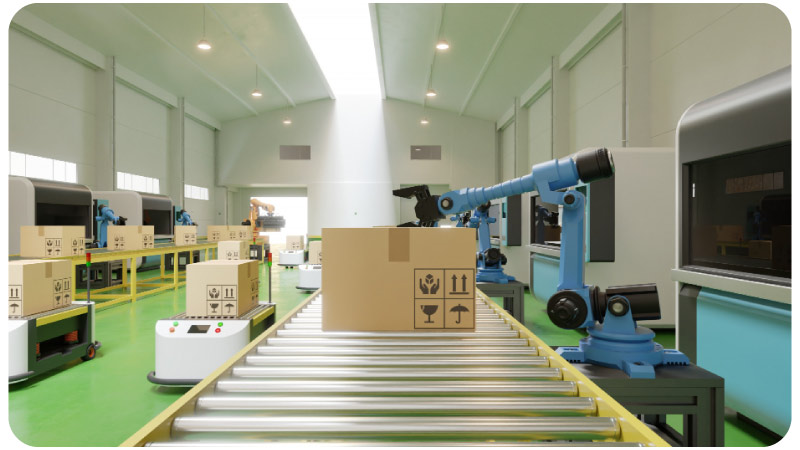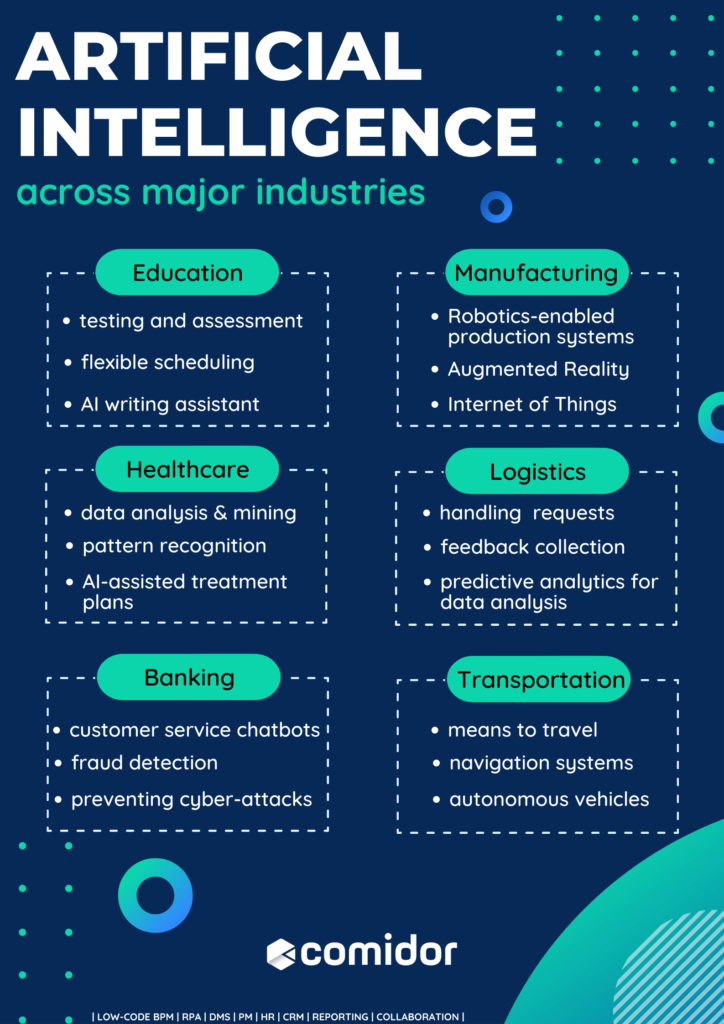Applications of Artificial Intelligence Across Major Industries
Blog: Comidor Blog
Artificial Intelligence has been changing the way businesses work for decades. It can be found in manufacturing, healthcare, sales, academics, law, and so on. Today organizations are utilizing Artificial Intelligence across industries to streamline their processes and cut operational costs. The future of work is slowly becoming more automated and AI-powered. There is a lot of hype around it, but there are many opportunities for the real value of AI to be seen in major industries. This article will take a look at some of the applications of Artificial Intelligence across major industries and how AI is changing them for the better.
Why Businesses Need Artificial Intelligence
Artificial Intelligence (AI) is a computing technology that uses machines to emulate human intelligence. It’s true that it has the potential to change the way businesses operate. However, the question on how to best implement Artificial Intelligence is a complicated one. You can’t just force automation onto a company without considering the company’s business needs and wants. In most cases, businesses are increasingly looking for ways to improve their productivity and reduce costs by automating business processes. Artificial Intelligence can provide a more efficient and effective way of doing business. As Artificial Intelligence is gaining momentum, more and more companies will use AI and machine learning algorithms to identify patterns in data and then use them to improve business operations.
The Real Value of Artificial Intelligence Across Multiple Industries
What are the benefits of AI? Why should we care about its use in different sectors? These are some important questions that will be answered as we are moving forward. AI technologies have been around for decades now and have been impacting different industries in different ways. Their impact is not just restricted to the tech industry, which has been the primary driver of AI adoption. In a new forecast by Gartner, it was found that “Worldwide Artificial Intelligence software revenue is forecast to total $62.5 billion in 2022, an increase of 21.3% from 2021“. This is a staggering number that clearly indicates that businesses are investing heavily in AI and its potential economic benefits.
AI has many benefits in the workplace. It can help automate manual processes, improve business processes, and save time for the person who is struggling to keep up with deadlines. It can also help companies create better products and services, build better relationships with their customers, and improve customer service.
 Artificial Intelligence in Education
Artificial Intelligence in Education
In this section, we will be exploring how AI software can improve education systems.
AI has a wide range of benefits in education systems:
-
Improved efficiency and accuracy – AI is often used in large scale testing and assessment, which helps teachers better understand student learning by providing feedback on the effectiveness of their instruction
-
Higher Quality Education – Automation and AI also provides higher quality education because it offers flexible scheduling that gives students more time for studying and encourages them to learn more
-
AI Writer – If someone is in dire need of searching for a person who will write an essay or help in checking the errors then AI is way too far in this field
All in all, automation and Artificial Intelligence in education are the future and we need to embrace them. Automated learning systems and automated teaching tools can help educators with their day-to-day work, allowing them to focus more on students and create a better educational experience for them.
Artificial Intelligence in Manufacturing
The use of AI in manufacturing has the potential to usher the industry into a new era of increased productivity and profitability. AI could help manufacturers reduce their operational costs through intelligent automation and optimization, while also increasing their agility to adapt to changing market conditions.
Experts believe that many of the tasks in manufacturing will be either partially or entirely automated in the upcoming years. The research predicts that this will lead to an increase in job demand for people with technical skills.

Here are three solutions that will help you fulfill your manufacturing company needs and market demands
-
Robotics-enabled production systems: This includes robotics-enabled assembly lines, which can reduce labor costs while improving quality and consistency. It also includes robotic warehouses, which can improve inventory accuracy and distribution speed while reducing human error risk.
-
Augmented Reality (AR): AR is a technology that integrates digital data into the user’s environment or real world. It is being used in factories across the world to streamline production and operations. It is able to provide the factory manager with a graphical representation of factory operations, including statistical data from machines and control panels.
-
Internet of Things (IoT): The Internet of Things is a network of physical objects that are embedded with electronics, software, sensors, and connectivity to enable objects to collect and exchange data. The Internet of Things provides manufacturing companies with a huge opportunity to reduce costs, improve quality, and increase efficiency. From automatically gathering information by using IoT-connected devices, and redesigning workspaces to enhance employee safety, to monitoring workers’ wellbeing, IoT offers plenty of benefits to manufacturing companies.
Artificial Intelligence in Healthcare
Artificial intelligence has been used in healthcare for a long time. In the past, AI was mainly used for data analysis and pattern recognition. Nowadays, AI has been applied to more fields in healthcare. Some of the examples include medical imaging, decision support systems, and data mining. It is also used to make decisions about patients in the hospitals. This can include what kind of treatment they should receive or how their care should be managed. Patient outcomes can be monitored by using AI techniques like machine learning and deep learning to analyze patterns in health records, medical images, and other types of patient information that are typically stored in electronic health records (EHRs). With the help of AI, doctors can spend their time with patients and not on paperwork. It can also process data more accurately than human doctors.
Here are 3 main use cases of AI applications in the healthcare industry:
-
AI can help with patient records and doctor’s appointments by managing the most important details of each case
-
AI can analyze data from various sources, such as medical records, clinical trials, research papers, and journals to diagnose a patient
-
AI can assist in delivering care to patients by following treatment plans written by doctors or nurses on a computer or on paper
AI in Logistics
Logistics is the backbone of any business. Without it, no enterprise can survive. This happens because warehouse management, order fulfillment, and logistics all depend on what happens at the warehouse.
The five key solutions to fulfillment logistics company needs with intelligent automation are:
-
Automated Warehouse Management System
-
Automated Order Fulfillment
-
Warehouse Inventory Control System
-
Material Storage and Distribution Technologies
-
Optimized Delivery Technologies
When it comes to logistics, the most important thing is to be able to “react” in a timely manner. You need to be able to adapt quickly and efficiently when you have a change in demand. According to Comidor experts’ maintenance of your workflows is way too necessary. With an increase in demand for AI-driven solutions, it is important to have guidelines to implement these technologies in a way that doesn’t disrupt the business. The following are some guidelines to help you implement artificial intelligence into your company’s logistics system:
-
Increase automation – Leveraging intelligent automation solutions and advanced technologies like Artificial Intelligence, to automate and optimize manual, repetitive tasks and processes lead to enhanced productivity, efficiency, and business growth.
-
Focus on customer experience – With the use of Artificial Intelligence, logistics companies can focus on delivering exceptional customer experience. Handling customer requests and getting feedback are some of the AI applications in Logistics, that enable businesses to save time and focus on highly demanding tasks.
-
Increase data collection – The use of Artificial Intelligence to collect and analyze data in logistics can help to make better decisions, reduce costs and improve the efficiency of operations. It can also help companies achieve their goals and increase their competitiveness in the market.
-
Implement Predictive Analytics – Predictive analytics helps companies know how to use historical data to predict future trends and behavior. These systems can identify customer behavior, such as the probability that a specific customer will churn or their likelihood of making a purchase, and help companies make decisions based on those predictions.
AI in the Banking Industry
Banking, like many other industries, is facing the disruption brought by Artificial Intelligence. AI has already changed how people interact with banks and financial institutions.
The first step in this transformation was customer service chatbots which are capable of answering simple queries and guiding users to the right decision. AI has also helped with fraud detection and preventing cyber-attacks. The next step is using machine learning to automate routine tasks for bank employees, freeing up time for them to focus on more complicated problems.
AI in the Transportation Industry
The development of AI has played a significant role in the evolution of transportation. It is considered to be one of the most important contributors to the development and growth of our society. AI’s role in transportation has been present since ancient times when it was used by these ancient civilizations as a means to travel over land and water. From carts and chariots to cars, ships, and airplanes, we can see how AI can make our lives much easier and more convenient.
AI also plays an important role in navigation systems for planes and ships. With these systems, we can know where we are at any point in time without having to use maps or other navigation tools that may not be accurate or may not exist at all.
AI is also used for autonomous vehicles that will eventually replace human drivers sooner or later.
Conclusion: The Future of AI in Our Everyday Lives and industries
In this article, we have covered various use cases of AI in our day-to-day lives. AI is a boon for businesses and industries alike. It can be used to generate data, detect fraud or even detect fraudulent data. All you need is a little imagination and creativity to use AI in your own ways and get the most out of it. Don’t know where to start from? Schedule a demo with our team, and let us take you on the intelligent automation journey.
Author’s Bio
Jhon Nick is a graduate of English Literature and Linguistics with more than 10 years of experience in writing. He is also an academic advisor at his university, where he helps students with their essays, assignments, and projects. Many people have a hard time finding who will write my essay. Here he comes! Jhon is also an experienced content writer, having written for various websites on diverse topics such as sports, politics, and lifestyle.
Learn how our Comidor AI software can revolutionize your business
The post Applications of Artificial Intelligence Across Major Industries appeared first on Comidor BPM Platform.
Leave a Comment
You must be logged in to post a comment.










